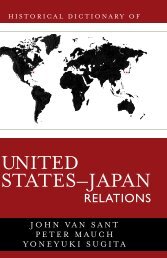Private Academies of Chinese Learning in Meiji Japan: The Decline ...
Private Academies of Chinese Learning in Meiji Japan: The Decline ...
Private Academies of Chinese Learning in Meiji Japan: The Decline ...
You also want an ePaper? Increase the reach of your titles
YUMPU automatically turns print PDFs into web optimized ePapers that Google loves.
160 PRIVATE ACADEMIES OF CHINESE LEARNING IN MEIJI JAPANwithout be<strong>in</strong>g able to wait until his enemy had f<strong>in</strong>ished hisexposition, he let out his hard question. S<strong>in</strong>ce he had<strong>in</strong>vestigated so thoroughly, he stubbornly discussed thecharacter and the speaker was greatly teased, but becausehe was teased too much, he eventually lost his temper andtold his tormentor, “I th<strong>in</strong>k it is enough to understand thegeneral outl<strong>in</strong>e <strong>of</strong> the texts I read, so I do not bother withth<strong>in</strong>gs like <strong>in</strong>terpret<strong>in</strong>g every detail”, and so the two arguedfiercely. 117Because the boarders <strong>of</strong> a juku formed a close-knit community, itis easy to assume that ties between students <strong>of</strong> a juku wereparticularly close and could last a lifetime. But were such tiescloser than school ties <strong>in</strong> general? <strong>The</strong>re is occasional evidence <strong>of</strong>their political significance. When Inukai Tsuyoshi, a formerstudent at San’yō juku, stood for election to <strong>Japan</strong>’s firstparliament, some <strong>of</strong> his former fellow students mounted acampaign to support him. In this case the men <strong>in</strong> question alsocame from the same region. 118 Another example <strong>of</strong> juku ties usedfor political ends is that <strong>of</strong> Mak<strong>in</strong>o Kenjirō's and FujisawaGenzō’s role <strong>in</strong> the 1911 textbook controversy about the depiction<strong>of</strong> the Nanbokuchō period (period <strong>of</strong> the imperial schism <strong>in</strong> thefourteenth century). Aroused by a lead<strong>in</strong>g article <strong>in</strong> thenewspaper Yomiuri sh<strong>in</strong>bun <strong>in</strong> January 1911, two pr<strong>of</strong>essors <strong>of</strong>Waseda University, Matsudaira Yasukuni and Mak<strong>in</strong>o Kenjirō,persuaded Fujisawa Genzō, a son <strong>of</strong> Fujisawa Nangaku, to raisethe issue <strong>in</strong> parliament. Mak<strong>in</strong>o was a former student <strong>of</strong> FujisawaNangaku. 119How significant where such ties between students and whateffect did the experience <strong>of</strong> study at a juku have for the students’future lives? <strong>The</strong> importance <strong>of</strong> yūgaku <strong>in</strong> the late Tokugawa andearly <strong>Meiji</strong> period has been stressed, although the evidence is notconclusive. Most juku outside the large towns catered ma<strong>in</strong>ly forlocal students. Besides, the fact that many future leaders spenttime at a certa<strong>in</strong> juku does not <strong>in</strong> itself prove that the experiencewas decisive. Many juku can boast a few famous students, yetmost <strong>of</strong> their students are now forgotten. Thus it is difficult tomake a case that ties between people at juku were closer thanschool ties <strong>in</strong> general.Perhaps more remarkable is that <strong>in</strong> some cases ties betweenstudents <strong>of</strong> a juku extend to their descendants, although the jukuno longer exists. In November 1990 an association <strong>of</strong> descendants













